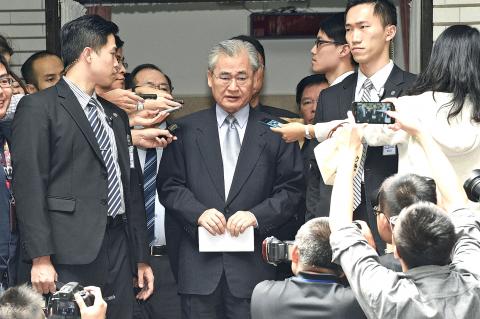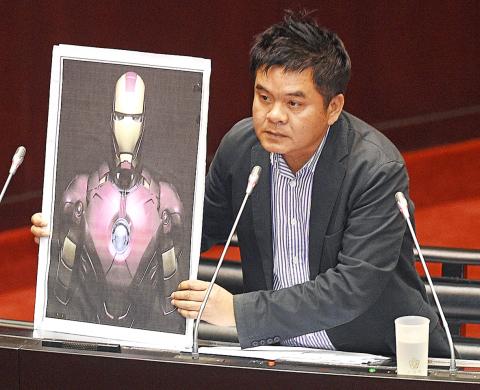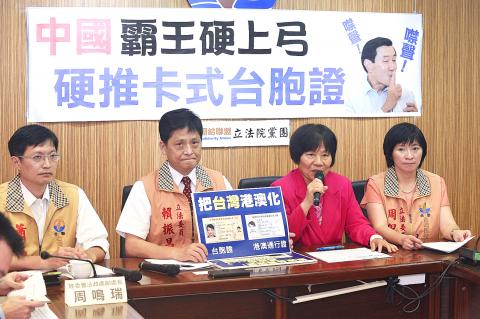China did not consult with Taiwan before implementing a new policy concerning the entry of Taiwanese visitors into its territory, Premier Mao Chi-kuo (毛治國) said yesterday, adding that the government is “extremely dissatisfied” with the lack of discussions.
“It has to be stated quite clearly that this is extremely hurtful to the feelings of our people,” Mao said during a question-and-answer session at the Legislative Yuan.
China notified Taipei about the new electronic card before its trial in July and its full implementation yesterday, but without prior consultations, Mainland Affairs Council Deputy Minister Lin Chu-chia (林祖嘉) said.

Photo: Chen Chih-chu, Taipei Times
There has been a lack of consultation despite Taiwan’s persistent demand that there should be prior consultations before any important policy concerning cross-strait relations is announced, Lin told lawmakers.
Taiwan had asked Beijing whether the use of the new card might be expanded, but no response has been received, Lin added.
The new credit card-sized travel pass replaces the “Taiwan compatriot travel document” (台胞證) that Taiwanese have used until now.

Photo: Chen Chih-chu, Taipei Times
In a public notice issued on Tuesday last week, Beijing said Taiwanese could apply to its public security departments above the county level to exchange their travel document for the new card and authorities would stop issuing paper documents yesterday.
Those who hold a paper “Taiwan compatriot travel document” could continue to use it until it expires, Lin said.
To coincide with the introduction of the new card, Beijing began in July to grant permit-free treatment to Taiwanese, which removed the need for an entry permit.

Photo: Chen Chih-chu, Taipei Times
The integrated-chip card system was implemented on a trial basis on July 1, less than a month after Beijing announced the change, and Taiwan was officially informed of the policy 20 minutes before it took effect, Mainland Affairs Council Minister Andrew Hsia (夏立言) said.
China’s unilateral decision to adopt the new card on such short notice showed disrespect for Taiwan, Hsia said during a visit to the US in July.
The switch to a smart card has created suspicion among many Taiwanese that Beijing is using it to downgrade Taiwan’s status to that of Hong Kong and Macau.
The card is similar to the “Hong Kong and Macau resident travel permit to enter the interior” (港澳居民來往內地通行證), which is also known as a “home visit permit” (回鄉證), critics have said.
Some Taiwanese academics have also voiced concern about possible data security breaches with the use of the card.
Experts have said that the smart chip embedded in the card would make it easy for Taiwanese tourists in China to be subjected to police surveillance.

CHAOS: Iranians took to the streets playing celebratory music after reports of Khamenei’s death on Saturday, while mourners also gathered in Tehran yesterday Iranian Supreme Leader Ayatollah Ali Khamenei was killed in a major attack on Iran launched by Israel and the US, throwing the future of the Islamic republic into doubt and raising the risk of regional instability. Iranian state television and the state-run IRNA news agency announced the 86-year-old’s death early yesterday. US President Donald Trump said it gave Iranians their “greatest chance” to “take back” their country. The announcements came after a joint US and Israeli aerial bombardment that targeted Iranian military and governmental sites. Trump said the “heavy and pinpoint bombing” would continue through the week or as long

TRUST: The KMT said it respected the US’ timing and considerations, and hoped it would continue to honor its commitments to helping Taiwan bolster its defenses and deterrence US President Donald Trump is delaying a multibillion-dollar arms sale to Taiwan to ensure his visit to Beijing is successful, a New York Times report said. The weapons sales package has stalled in the US Department of State, the report said, citing US officials it did not identify. The White House has told agencies not to push forward ahead of Trump’s meeting with Chinese President Xi Jinping (習近平), it said. The two last month held a phone call to discuss trade and geopolitical flashpoints ahead of the summit. Xi raised the Taiwan issue and urged the US to handle arms sales to

State-run CPC Corp, Taiwan (CPC, 台灣中油) yesterday said that it had confirmed on Saturday night with its liquefied natural gas (LNG) and crude oil suppliers that shipments are proceeding as scheduled and that domestic supplies remain unaffected. The CPC yesterday announced the gasoline and diesel prices will rise by NT$0.2 and NT$0.4 per liter, respectively, starting Monday, citing Middle East tensions and blizzards in the eastern United States. CPC also iterated it has been reducing the proportion of crude oil imports from the Middle East and diversifying its supply sources in the past few years in response to geopolitical risks, expanding

Pro-democracy media tycoon Jimmy Lai’s (黎智英) fraud conviction and prison sentence were yesterday overturned by a Hong Kong court, in a surprise legal decision that comes soon after Lai was jailed for 20 years on a separate national security charge. Judges Jeremy Poon (潘兆初), Anthea Pang (彭寶琴) and Derek Pang (彭偉昌) said in the judgement that they allowed the appeal from Lai, and another defendant in the case, to proceed, as a lower court judge had “erred.” “The Court of Appeal gave them leave to appeal against their conviction, allowed their appeals, quashed the convictions and set aside the sentences,” the judges